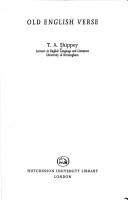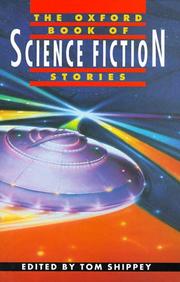| Listing 1 - 10 of 22 | << page >> |
Sort by
|

ISBN: 0091110300 0091110319 Year: 1972 Publisher: London Hutchinson university library
Abstract | Keywords | Export | Availability | Bookmark
 Loading...
Loading...Choose an application
- Reference Manager
- EndNote
- RefWorks (Direct export to RefWorks)
English poetry --- -Civilization, Anglo-Saxon, in literature --- Civilization, Medieval, in literature --- English literature --- History and criticism --- Civilization, Anglo-Saxon, in literature. --- Civilization, Medieval, in literature. --- History and criticism. --- Civilization, Anglo-Saxon, in literature
Book
ISBN: 1781384398 1786945169 1781382611 9781786945167 9781781384398 Year: 2016 Publisher: Liverpool : Liverpool University Press,
Abstract | Keywords | Export | Availability | Bookmark
 Loading...
Loading...Choose an application
- Reference Manager
- EndNote
- RefWorks (Direct export to RefWorks)
The fifteen essays collected in Hard Reading argue, first, that science fiction has its own internal rhetoric, relying on devices such as neologism, dialogism, semantic shifts, the use of unreliable narrators. It is a "high-information" genre which does not follow the Flaubertian ideal of le mot juste, "the right word", preferring le mot imprévisible, "the unpredictable word". Both ideals shun the facilior lectio, the "easy reading", but for different reasons and with different effects.
The essays argue further that science fiction derives much of its energy from engagement with vital intellectual issues in the "soft sciences", especially history, anthropology, the study of different cultures, with a strong bearing on politics. Both the rhetoric and the issues deserve to be taken much more seriously than they have been in academia, and in the wider world.Each essay is further prefaced by an autobiographical introduction. These explain how the essays came to be written and in what ways they (often) proved controversial. They, and the autobiographical introduction to the whole book, create between them a memoir of what it was like to be a committed fan, from teenage years, and also an academic struggling to find a place, at a time when a declared interest in science fiction and fantasy was the kiss of death for a career in the humanities.
Science fiction. --- Books and reading. --- Appraisal of books --- Books --- Choice of books --- Evaluation of literature --- Literature --- Reading, Choice of --- Reading and books --- Reading habits --- Reading public --- Reading --- Reading interests --- Reading promotion --- Science --- Science stories --- Fiction --- Future, The, in literature --- Appraisal --- Evaluation --- Science fiction --- History and criticism. --- literary studies --- science fiction --- anthropology --- academia --- history --- politics
Book
ISBN: 1802700552 1802700544 1641899336 1802700137 Year: 2022 Publisher: Leeds : Arc Humanities Press,
Abstract | Keywords | Export | Availability | Bookmark
 Loading...
Loading...Choose an application
- Reference Manager
- EndNote
- RefWorks (Direct export to RefWorks)
Ever since Tolkien's famous lecture in 1936, it has been generally accepted that the poem Beowulf is a fantasy, and of no use as a witness to real history. This book challenges that view, and argues that the poem provides a plausible, detailed, and consistent vision of pre-Viking history which is most unlikely to have been the poet's invention, and which has moreover received strong corroboration from archaeology in recent years. Using the poem as a starting point, historical, archaeological, and legendary sources are combined to form a picture of events in the North in the fifth and sixth centuries: at once a Dark and a Heroic Age, and the time of the formation of nations. Among other things, this helps answer two long-unasked questions: why did the Vikings come as such a shock? And what caused the previous 250 years of security from raiders from the sea?
LITERARY CRITICISM / Medieval. --- The early North, Geatas, Tolkien, Scandinavia,. --- Beowulf. --- Scandinavia --- Civilization --- History. --- History --- Civilization. --- Barbarism --- Civilisation --- Auxiliary sciences of history --- Culture --- World Decade for Cultural Development, 1988-1997 --- Beowulf --- To 1397 --- Europe --- Europe, Northern --- Scandinavie --- Europe septentrionale --- Northern Europe --- Antiquities. --- Histoire --- Civilisation. --- Antiquités. --- Civilization, Viking. --- Mythology, Norse. --- Criticism and interpretation. --- Scandinavia.
Book
ISBN: 9781781384398 9781781382615 Year: 2016 Publisher: Liverpool Liverpool University Press
Abstract | Keywords | Export | Availability | Bookmark
 Loading...
Loading...Choose an application
- Reference Manager
- EndNote
- RefWorks (Direct export to RefWorks)
The fifteen essays collected in Hard Reading argue that science fiction has its own internal rhetoric, relying on devices such as neologism, dialogism, semantic shifts, the use of unreliable narrators. It is a “high-information” genre which does not follow the Flaubertian ideal of le mot juste, “the right word”, preferring le mot imprévisible, “the unpredictable word”. Science fiction derives much of its energy from engagement with vital intellectual issues in the “soft sciences”, especially history, anthropology, the study of different cultures, with a strong bearing on politics. Both the rhetoric and the issues deserve to be taken much more seriously than they have been in academia, and in the wider world. Hard Reading is also a memoir of what it was like to be a committed fan, from teenage years, and also an academic struggling to find a place, at a time when a declared interest in science fiction and fantasy was the kiss of death for a career in the humanities.
Book
ISBN: 9781802700541 9781802700138 Year: 2022 Publisher: Leeds Arc Humanities Press
Abstract | Keywords | Export | Availability | Bookmark
 Loading...
Loading...Choose an application
- Reference Manager
- EndNote
- RefWorks (Direct export to RefWorks)
Book
Year: 1972 Publisher: London Hutchinson University Library
Abstract | Keywords | Export | Availability | Bookmark
 Loading...
Loading...Choose an application
- Reference Manager
- EndNote
- RefWorks (Direct export to RefWorks)

ISBN: 0192142046 0192831674 Year: 1992 Publisher: Oxford [England],New York : Oxford University Press,
Abstract | Keywords | Export | Availability | Bookmark
 Loading...
Loading...Choose an application
- Reference Manager
- EndNote
- RefWorks (Direct export to RefWorks)
Book
ISBN: 9781780239095 Year: 2018 Publisher: London : Reaktion Books,
Abstract | Keywords | Export | Availability | Bookmark
 Loading...
Loading...Choose an application
- Reference Manager
- EndNote
- RefWorks (Direct export to RefWorks)
Vikings --- Civilization, Viking. --- Death --- Old Norse literature --- Social life and customs. --- History --- History and criticism.
Book
ISBN: 9781789142174 Year: 2019 Publisher: London Reaktion Books
Abstract | Keywords | Export | Availability | Bookmark
 Loading...
Loading...Choose an application
- Reference Manager
- EndNote
- RefWorks (Direct export to RefWorks)
In this robust new account of the Vikings, now available in paperback, Tom Shippey explores their mindset, and in particular their fascination with scenes of heroic death. Laughing Shall I Die considers Viking psychology by weighing the evidence of the sagas against the accounts of the Vikings' victims. The book recounts many of the great bravura scenes of Old Norse literature, including the Fall of the House of the Skjoldungs, the clash between the two great longships Ironbeard and Long Serpent, and the death of Thormod the skald. The most exciting book on Vikings for a generation, Laughing Shall I Die presents them for what they were: not peaceful explorers and traders, but bloodthirsty warriors and marauders.
Vikings --- Civilization, Viking --- Old Norse literature --- History and criticism
Book
Year: 1972 Publisher: London Hutchinson
Abstract | Keywords | Export | Availability | Bookmark
 Loading...
Loading...Choose an application
- Reference Manager
- EndNote
- RefWorks (Direct export to RefWorks)
| Listing 1 - 10 of 22 | << page >> |
Sort by
|

 Search
Search Feedback
Feedback About UniCat
About UniCat  Help
Help News
News